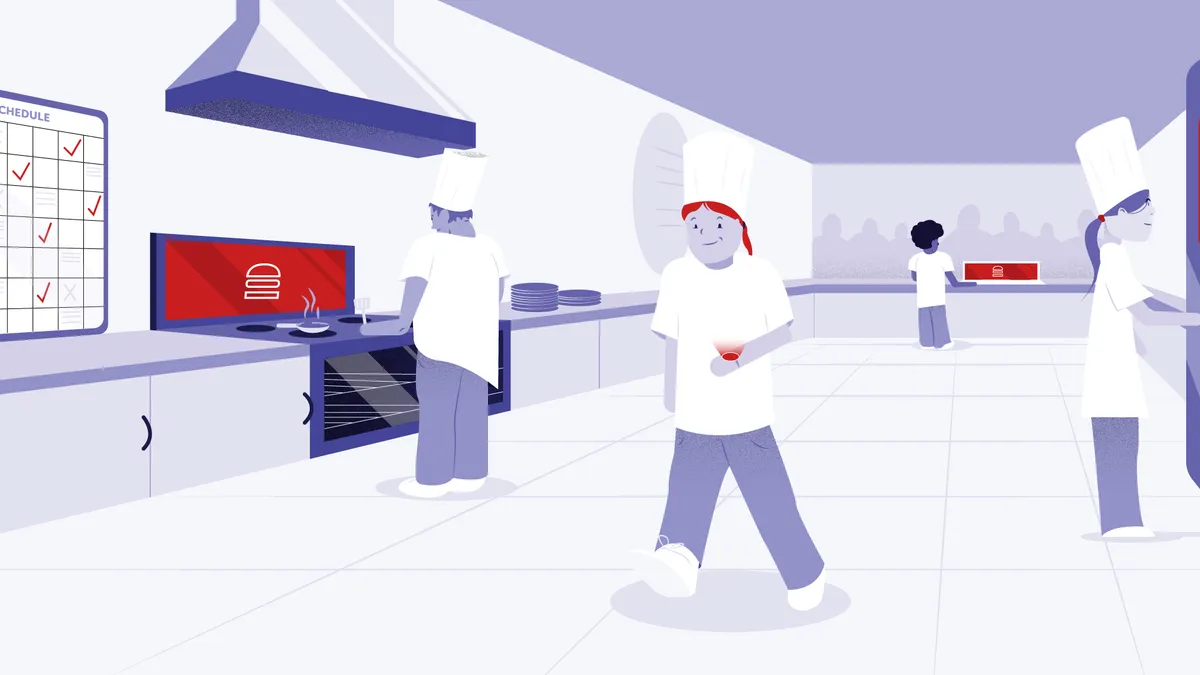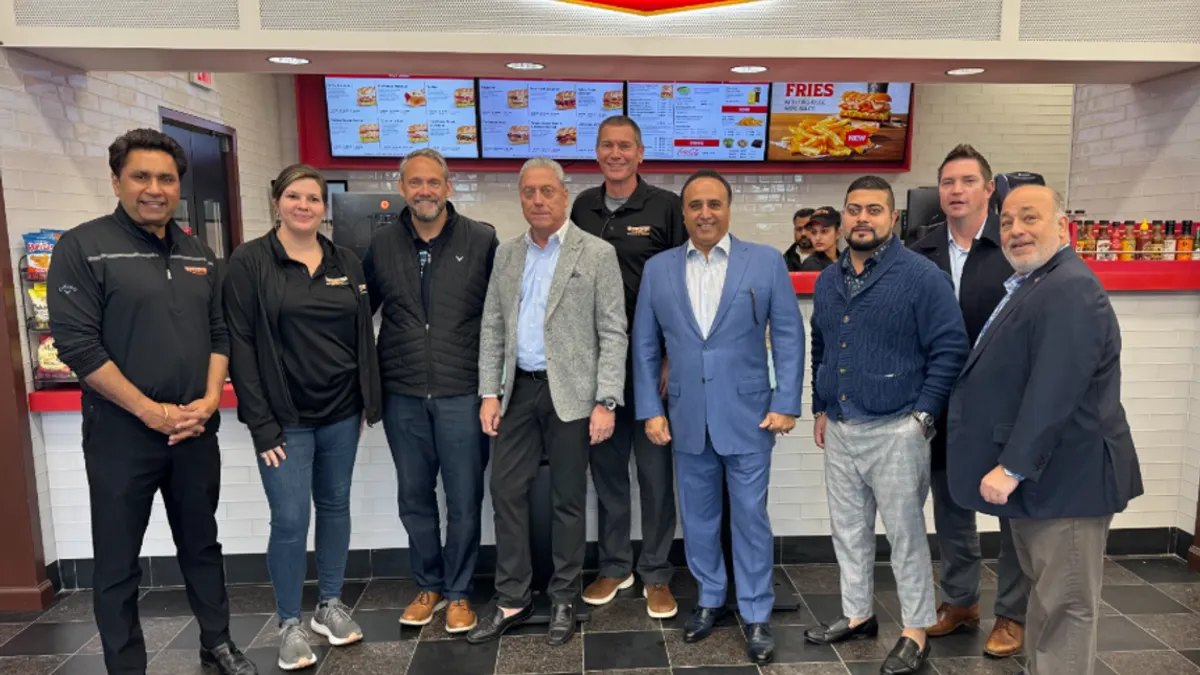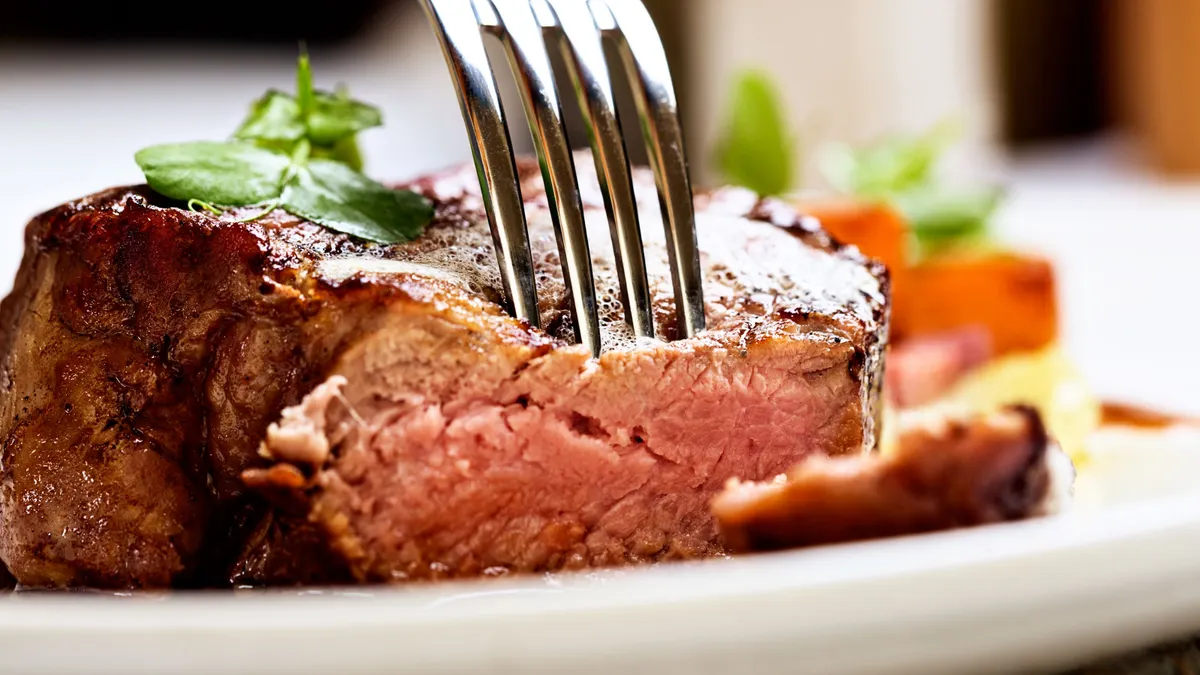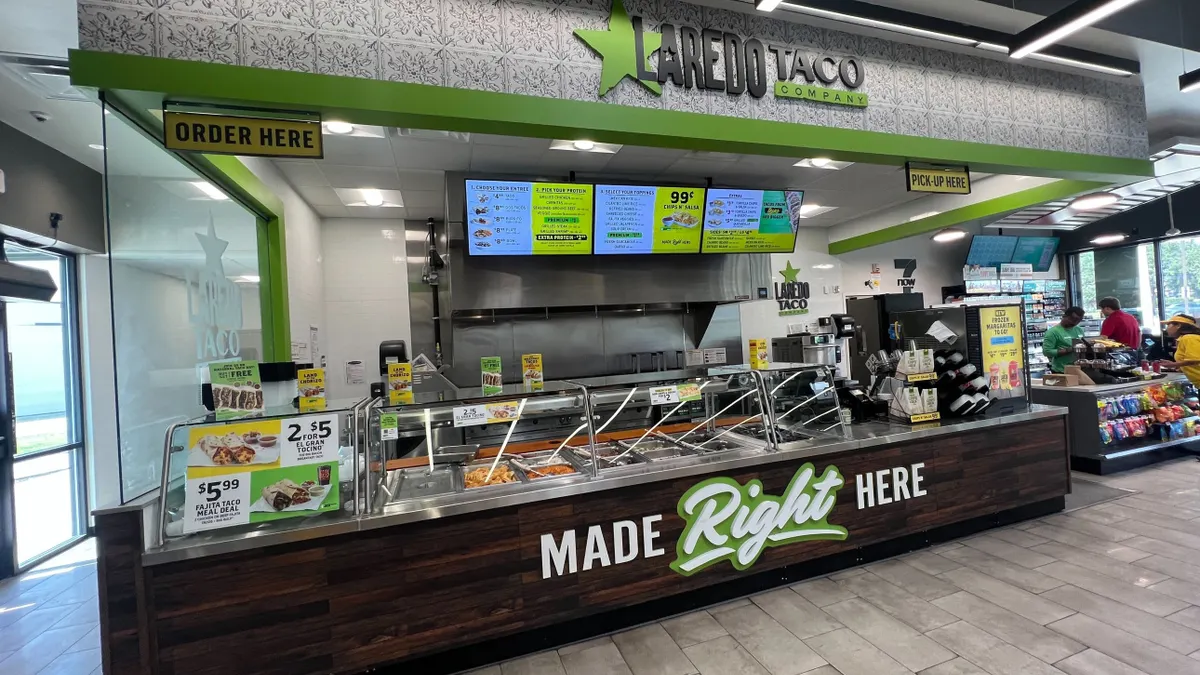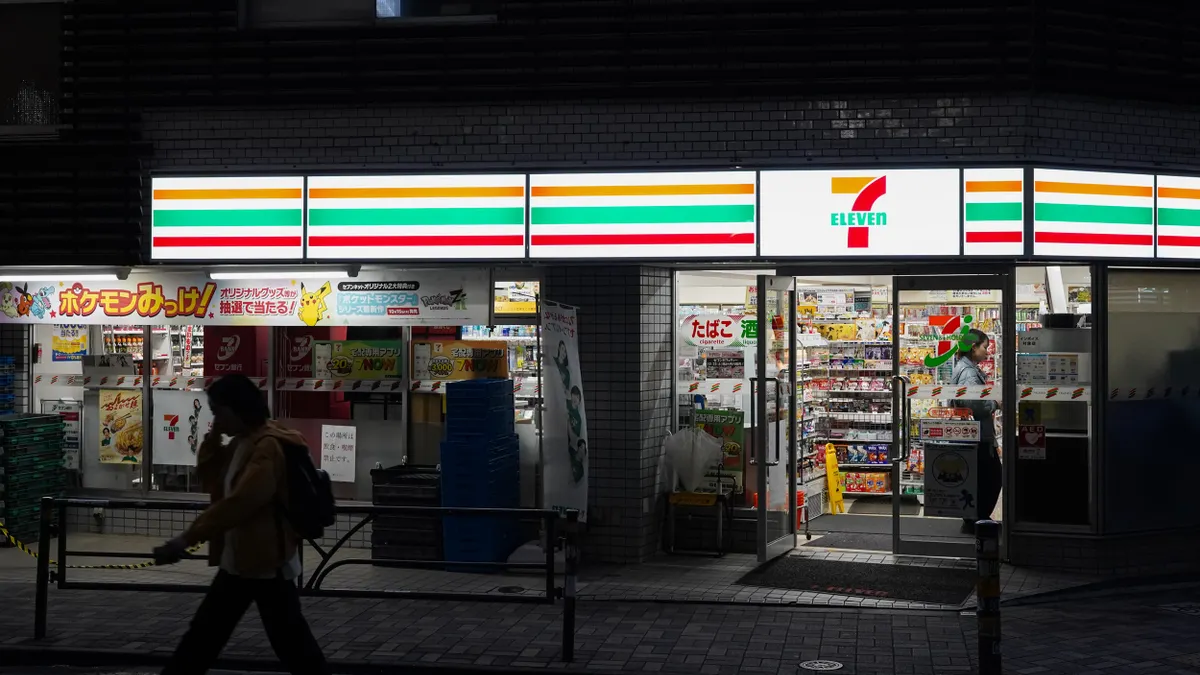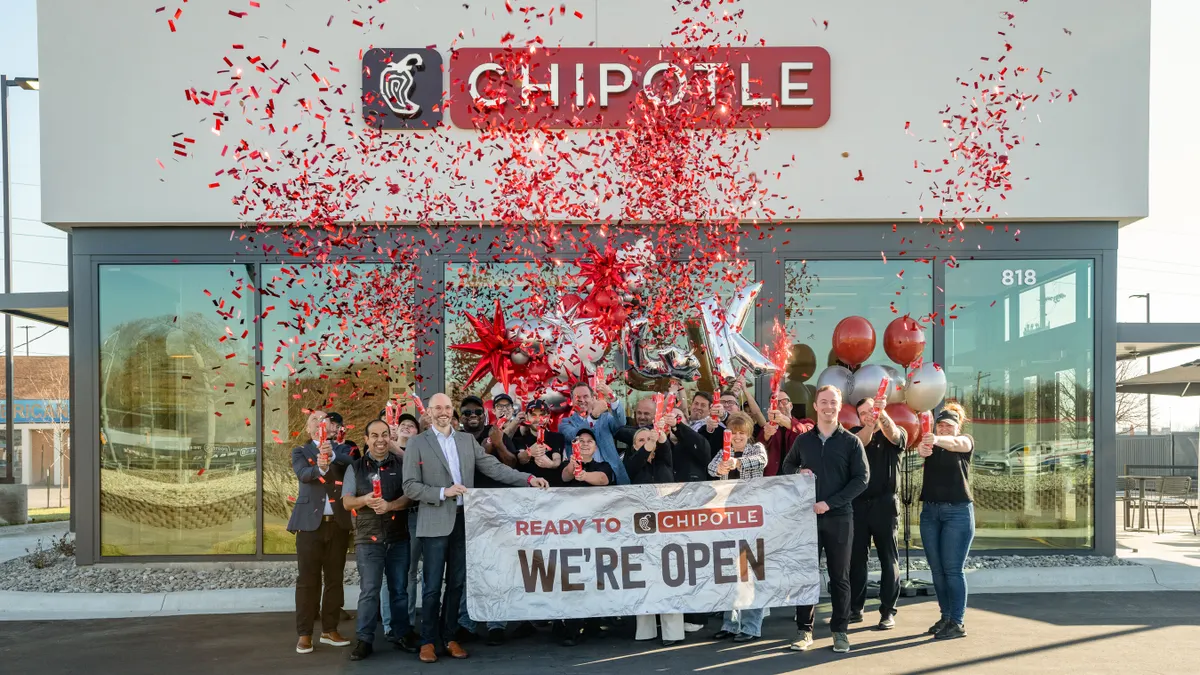This is the second in a series of articles looking at the impact of artificial intelligence and emerging technologies in restaurants.
Artificial intelligence is becoming a crucial asset in the restaurant technology playbook. But as many brands invest in consumer-facing products like automated drive-thrus and in-store kiosks, experts argue that back-of-house improvement will have the biggest impact on bottom lines.
As the industry nears an AI tipping point, it’s more important than ever for smaller companies to seriously consider how to implement the tech in their systems — or risk facing serious consequences in three to five years, Aaron Allen & Associates CEO Aaron Allen told Restaurant Dive.
"We see massive closures and bankruptcies and retooling of restaurants in much the same way we're seeing in retail," Allen said.
Major chains like McDonald's and Yum Brands are already leading the way with significant investments or acquisitions. The technological capabilities they are building into their overall operations will make their competition obsolete, Allen said.
Creating efficiencies with food, supply chain, labor and equipment through AI will pay off several years down the line, experts told Restaurant Dive, especially since it can take time to collect the necessary data to properly deploy the technology.
"The ones that are [adopting technology] are building a strong position in the market where we'll see tens of billions of dollars in market share and market capitalization move to those that are doing things now early on," Allen said.
Food cost savings
Food costs are one of the biggest expenses for a restaurant, making up to one third of a company's expenses, SevenRooms co-founder and CEO Joel Montaniel told Restaurant Dive. Even with careful planning, food waste is still prevalent, and restaurants often over-order ingredients that don't get consumed, he said.
"It's more of an art than a science," Montaniel said.
SevenRooms offers a tech platform to manage reservations, guest engagement and marketing, and is working with Amazon to use its Alexa voice-automated capabilities.
"When people say AI, people are imagining a world of robots, a Terminator scenario, where it is all bad. I don't think that necessarily has to be the case. As long as the AI is done in a way that enhances the guest experience, the industry will embrace it."

Joel Montaniel
Co-founder and CEO, SevenRooms
With data, restaurants will have individual guest consumption and know a certain percentage of people coming in that week will eat french fries, for example, or how many potatoes should be ordered, he said. Having this data could also allow restaurants to connect with farms so they know how many potatoes should be grown as well, Montaniel said.
AI can be particularly useful in managing inventory and placing orders without having to track down sales reps, which saves time — something especially valuable for independent operators, Christopher Elliot, co-founder and chief operating officer at Cheetah Technologies, told Restaurant Dive. His company allows operators to order supplies and food online without having to go through a sales rep or negotiate special pricing, he said.
Cheetah Technologies is currently working to provide an autoship feature where it can use purchase history to recommend an order. Machine learning and AI would be built into this system, Elliot said. This feature is expected to launch within the next six to 12 months.
While technology can remove some guesswork from food orders, its bigger impact will be on saving labor costs, which will pay off quickly, experts said.
Labor efficiency
The combination of a labor shortage and minimum wage hikes have operators scrambling to find a way to increase workforce efficiencies, and AI is an increasingly integral asset here. McDonald's, for example, is testing an automated fryer while startup tech companies have created robot chefs and bussers.
"As labor has gone up enough, robots are starting to make more sense," Allen said.
But that doesn't mean the restaurant of the future will be entirely run by robots, either. Humans will always be a part of the restaurant experience, especially in the full-service segment where the guest experience is of top concern, Montaniel said.
"When people say AI, people are imagining a world of robots, a Terminator scenario, where it is all bad," Montaniel said. "I don't think that necessarily has to be the case. As long as the AI is done in a way that enhances the guest experience, the industry will embrace it."
With operators able to predict sales volume for the coming days, weeks and beyond, they will also be able to better understand their labor needs and which times and days need to be filled, Don Zimmerman, vice president of hospitality and product management at NCR, told Restaurant Dive. NCR offers consumer transaction technology across multiple industries, including restaurants.
And AI will only become better, especially as more data is collected, eventually allowing for real-time monitoring, he said.
AI can also better solve last-minute staffing challenges. If there are several unanticipated cancellations right before Saturday night dinner, a manager could quickly notify servers and readjust who needs to be at work down to the minute, and possibly find them alternative tasks if another restaurant is short on staff, Montaniel said.
While there will likely be labor savings, the AI will remove time-consuming grunt work, allowing them to better use their time, Zimmerman said.
"If managers aren’t chained to the back of the restaurant at the desk, but can still keep tabs of everything, … they can be much more involved in the delivery of hospitality, which is probably what the brand is more focused on," he said.
Restaurants may shift to leasing equipment
While AI can increase efficiencies in the labor force overall, smart kitchens that use the Internet of Things could also create more connectivity and easier monitoring. That means equipment with more sensors that can measure humidity levels and temperature and even use biometrics, among other things, Allen said. AI will be able to measure stock levels, productivity, utilization, capacity, throughput and bottlenecks in the kitchen, he said.
If a cooler went out overnight, an operator would be able to have data on the food temperature to know if it needs to be thrown out, which would improve food safety, he said.
AI could also be used to monitor time and motion in the kitchen to see where workers are spending the most time, and could lead to better designed kitchens to increase efficiency, Allen said.
With so much monitoring synched to equipment, the way operators buy equipment would also change. Instead of purchasing products and keeping them for eight to 10 years, equipment suppliers would likely switch to a leasing model, where equipment would be swapped in more frequently with updated software. This would look much like the current smartphone industry, where devices are swapped out every few years, he said.
While this may mean some additional upfront costs with leasing equipment, operators would gain additional insights and efficiency that would pay off in the long run, he said.
"Saving more on labor should have a net reduction in cost," he said.
Adoption remains slow
Even though large restaurant companies are adopting new technologies rapidly, smaller ones don’t think it will impact them, and have been slow to act, Allen said. Operators are already balancing busy day-to-day operations to think about tech innovations, Allen said.
"How do you make sense of all of this quick enough and what are the right priorities? If you're closing locations, are you really thinking about … what 5G is and how it applies to your business?" Allen said. "In a lot of cases, they're not."
Restaurants often wait until something is broken to then fix it and then decide to explore innovation and technology, he said. By not thinking ahead, operators risk long-term success and could instead face bankruptcy, closure or consolidation in three to five years, Allen said.
A lot of applications of AI also aren't yet known, and that's because not enough data has been collected within the restaurant industry to figure out how machine learning can improve it, experts said. But that is quickly changing.
Point-of-sale systems are giving restaurant operators access to data that they couldn't collect previously, because these platforms can keep track of transactions at a very detailed level, Zimmerman said.
"Because of the nature of AI, it considers more options and permutations. The more data that you can give it, the more accurate it can be," Zimmerman said.
Experts are calling the restaurant segment's current relationship with AI phase one, and once enough data is collected, the technology will be able to be deployed more fully.
"I think it is going to grow in ways we probably haven't even all anticipated yet," Zimmerman said.


